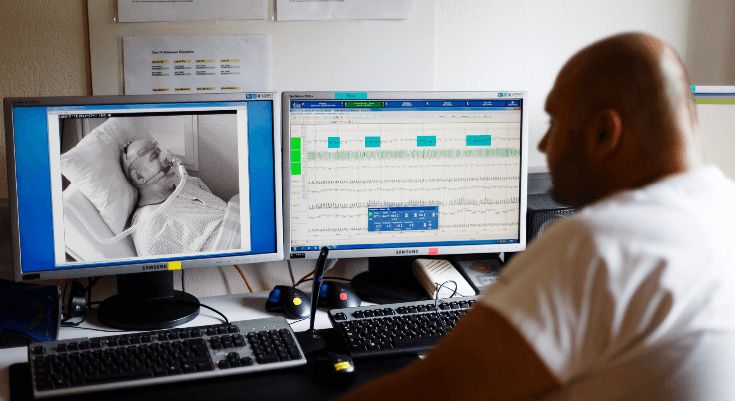However, symptoms can often be alleviated and quality of life improved by providing respiratory support through ventilation therapy. This is illustrated below using two examples of special forms of neuromuscular diseases.

Various neurological diseases lead to a weakening of the respiratory muscles, which is often perceived as breathlessness and reduced performance or can lead to sleep disorders and other complaints.
However, symptoms can often be alleviated and quality of life improved by providing respiratory support through ventilation therapy. This is illustrated below using two examples of special forms of neuromuscular diseases.

Amyotrophic lateral sclerosis (ALS) is a disease that leads to muscle weakness due to the degeneration of nerve cells in the spinal cord and brain. Depending on the form of the disease, the arms, legs, throat muscles or mainly the respiratory muscles can be affected. The disease usually progresses slowly or in relapses.
Various symptoms such as muscle cramps, salivary drip, speech and swallowing disorders can be alleviated with suitable treatments. Weakness of the respiratory muscles can be indicated by reduced physical performance, tiredness, headaches, shortness of breath, especially when lying down, and frequent respiratory infections. Special lung function tests and examinations in the sleep laboratory are used for early detection of respiratory muscle weakness. Breathing support through mask ventilation can significantly alleviate respiratory distress, improve sleep quality and increase physical performance.
While ALS usually affects older people, Duchenne muscular dystrophy (DMD) is already noticeable in childhood. DMD is a genetic disease that only affects males (one in 3,300 male births), while women are carriers. The disease begins in infancy with gait disorders, leads to wheelchair dependency at the age of 10-14 and to complete dependency on mechanical ventilation at the age of 18-22. A growing number of DMD patients, the majority of whom live and are trained at the Mathilde Escher Heim (MEH), Zurich, are being cared for at the Clinic for Pneumology. Thanks to optimal care and long-term ventilation, life expectancy with DMD has increased significantly in recent years. In a much-noticed study, we were able to show that DMD patients feel they have a good quality of life and a strong will to live despite their physical disability.
Optimal interdisciplinary care means that complications such as pneumonia, life-threatening constipation with paralysis of the bowel (ileus) and cardiac insufficiency can be detected and treated at an early stage.
The Department of Neurology and Pneumology at the University Hospital Zurich and the Children’s Hospital Zurich have pooled their expertise in the Neuromuscular Center to guarantee continuous, comprehensive diagnosis, treatment and support for children and adults with muscle and nerve disorders.
We also work closely with the Mathilde Escher Heim in Zurich, which specializes in the care of people with progressive muscle disease.
As a patient, you cannot register directly for a consultation. Please get a referral from your primary care physician, specialist. For questions please use our contact form.
University Hospital Zurich
Department of Pulmonology
PD Dr. med. Esther Irene Schwarz
Raemistrasse 100
8091 Zurich